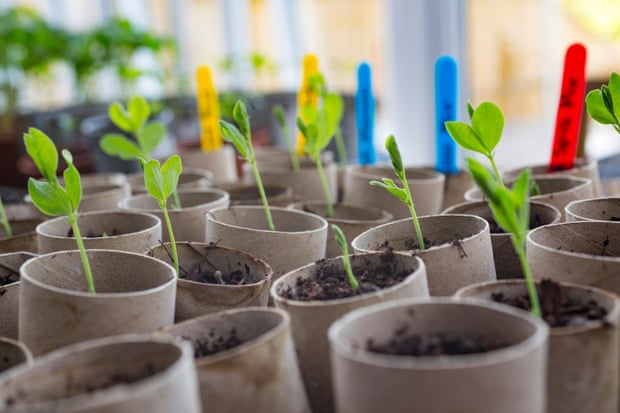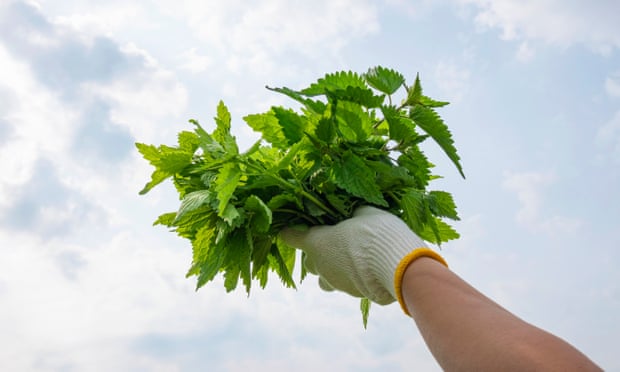
Who on earth wants fish tank wastewater, chicken poo, tumble-dryer lint, loo roll tubes, “a plaster mould of a Komodo dragon’s foot” or half a broken toilet? No one, you might think, but the Buy Nothing community begs to differ: these are all real “gifts” snapped up by more than 5 million members worldwide, who give away their unwanted items in the local community. It’s living proof that “one person’s trash is another’s treasure”, as Alisa Miller, the administrator of the Blackheath/Charlton/Lewisham group puts it.
Miller offered her daughter’s broken toy birdcage with little hope anyone would want it; it was snapped up by a local flower-arranging enthusiast, and filled with succulents and trailing plants. Her co-administrator’s son is the current custodian of a toy helicopter that has been played with by five Buy Nothing families to date. Members ask for what they want and usually get it: anything from household appliances, furniture and gardening tools to clothes and baby gear.
There is nothing unique or original about giving and getting stuff for free. It’s a practice as old as humanity. The juggernaut giveaway network Freecycle was founded in 2003 – but what distinguishes the Buy Nothing project from Freecycle, Freegle, Olio and their ilk is that the emphasis is less on stuff, per se, and more on community. In what Buy Nothing describes as its “hyperlocal gift economies”, users are encouraged to let items “simmer” rather than giving them away to the first person who asks, perhaps suggesting they share a joke or provide a story explaining why they would like the item. In addition to “gifts” and “asks”, users are encouraged to post “gratitude”, with a message or a picture showing what a gifted item has meant to them.
That could all sound insufferably twee, but the thinking behind it is fairly radical. It’s a “social experiment”, explain the project’s founders, Rebecca Rockefeller and Liesl Clark, from their respective living rooms in Washington state, effecting a fundamental shift in our attitude to material goods by building a sense of community, and treating items as community-owned and shared. “If you come at it from an angle of joy and human connection,” says Rockefeller, “you’re more likely to inspire lasting change than when you come at it from telling people: ‘You have to do without this.’”
Clark, 55, and Rockefeller, 52, bonded as “Freecycle renegades”, Rockefeller says. She was trying to give away things (twigs, nettles) that her local Freecycle moderator did not consider suitable gifts; both were looking for a deeper connection beyond an anonymous back-door drop or pickup.

“We wanted more of that dialogue,” says Clark. Her attitude was shaped by her experiences as a film-maker, exploring mortuary caves on the Nepal-Tibet border with her husband and children. The objects they found there had been used, exchanged, appreciated and transformed over centuries. “It helped me understand a little more the practical side of reuse and how an entire culture could thrive without any stores.”
Users are encouraged to let items ‘simmer’ rather than giving them to the first person who asks
“The stuff is one thing, but the stories that go along with it – the humour, the poignancy, the memories – those are the things we really want from each other,” agrees Rockefeller. Both, too, were shocked at the tides of plastic detritus that washed up on the beaches of their home on Bainbridge Island. “It led us naturally to ask what role do we play in this and how can we lessen our impact?” The pair started out with an in-person gift exchange in a local park at weekends; they launched the first Facebook-hosted group in 2013.
I’m speaking to them surrounded by the debris of a minimal, but not particularly mindful Christmas: cardboard packaging, return labels and scraps of wrapping paper. It’s a time of year characterised for many of us by a sugar rush and guilt slump of conspicuous consumption. Buy Nothing offers members tools and approaches to counter that sickly consumption hangover, but “Buy Nothing” is the name, not the aim.
There’s no expectation or even aspiration that users will somehow forge a fully cashless economy. Indeed, during the pandemic, Buy Nothing changed its rules to allow members to give gifts of cash. “Quite literally, that’s a lifesaving gift you can give another person in a lot of cases,” says Rockefeller. “This was never meant to be an exercise in purity: that doesn’t serve us well. What serves us well is flexibility. A banana, a chunk of concrete or $10 – those are all good gifts.”

She speaks from personal experience: when the first Buy Nothing group was established, Rockefeller was an unemployed single mother. “I was having to go through the US social services system – it’s horrible and it’s intentionally meant to make you feel horrible about yourself.” Getting food and clothes for her children through Buy Nothing gave her financial breathing space. “I had money to go and buy a cup of coffee or a book, which would have been 100% unreachable for me.”
Of equal importance, she says, was being able to gift bread she had made or foods she had foraged, which allowed her to “get some dignity back”. “The services we can provide are gifts in themselves,” adds Clark. “Gifts of time” (babysitting, gardening, lifts) and “gifts of self” (social meet-ups, offers to become a workout buddy) are a key element of the Buy Nothing experience.
We quickly came to realise how lonely we actually are as a result of not sharing – Liesl Clark
From that first Facebook group, the community has expanded to 7,000 Buy Nothing groups with, at the most recent count, 5.3 million users in 44 countries as diverse as Guatemala, Iceland, Oman, Vietnam and Zimbabwe. On a slow day, Clark tells me, it gains 1,500 members. The greatest concentrations of communities are in Seattle and New York. There is also a huge, dynamic Australian Buy Nothing network. According to Buy Nothing figures, the UK has 50 active groups and approximately 40,000 members. Although Buy Nothing is described by Clark as “an open-source model”, most local groups operate on Facebook, for which Buy Nothing provides guidance, training and ground rules.
A healthy pattern of organic growth, with occasional viral spurts, accelerated during the pandemic. For Clark, physical isolation made people more aware of a deeper kind of isolation. “There’s this ethic of self-reliance, that you fill your house with all the things you need as a family – there you are against the world. But then the pandemic came along. We quickly came to realise how lonely we actually are as a result of not sharing. What we’ve observed is that if people couldn’t physically get together, they’ve been able to virtually connect through sharing items and services.”
Inevitably, this kind of growth creates challenges. As groups “sprout” – the Buy Nothing term for when they reach the maximum recommended capacity of 1,000 members and split geographically – redrawn boundaries have at times perpetuated or reinforced historic racial and socio-economic barriers. These issues have on occasion been compounded by the Facebook group structure where considerable power lies in the hands of local administrators, deciding who can join and what they can post.
Clark and Rockefeller have addressed Buy Nothing’s failings, including the “flaws and racism we as co-founders built into the original structure of this movement”, as they said in a June 2020 statement. An Equity Team now provides guidance to groups on how to develop an “actively anti-racist and anti-oppression policy”, including trying to use geographical group boundaries to create diverse sharing communities.
Miller worked hard to avoid creating a silo of privilege in south-east London when creating the community in 2019. “This area has got huge wealth inequality. It couldn’t be more diverse, and we intentionally wanted to make sure that we straddled those areas; that was a critical goal.”
The newly launched Buy Nothing app is designed to swerve the structural potential for inequity of the Facebook group model. Here, users choose their own geographical limits and create their own communities: “hyperlocal”, “neighbourhood+” or “surrounding areas”. “I’m really hoping our app makes this more accessible [to people] who have been unable for a variety of reasons to connect with it on other platforms, so we get a more diverse set of voices,” says Rockefeller.
There are personal costs to growth, too. A network of nearly 13,000 volunteer administrators keeps Buy Nothing functioning, assisted by a core staff of a dozen, all working from their kitchen tables and living rooms. Clark and Rockefeller have always been unpaid volunteers. “I work weekends, in the holidays, in the hours when you’re supposed to be sleeping,” says Clark, who was able to make money from film-making initially. “There’s certainly some joy in it, but it’s become unsustainable.”
I really believe this will help us, as individuals, to participate in our collective survival – Rebecca Rockefeller
Rockefeller has taken on part-time jobs over the years to support her full-time commitment to Buy Nothing. “My kids look at it as their sibling,” she says. “It’s not just me and Rebecca,” adds Clark. “The key volunteers are an incredible group of, basically, women, who are doing this unpaid labour and it’s not the model we want to promote for the world. We need to get a little more creative with this.”
They hope that the app will also allow them to capture data on what Buy Nothing does to reduce waste and waste management costs, thereby potentially enabling it to raise funds from municipalities. “We’ve never been able to study how much waste is being diverted from landfill,” says Clark. “Imagine if any given community could access that information?”
Moving from the germ of an idea to a global structure is challenging, but for Clark and Rockefeller, the impetus and the motivation is as strong as ever. I ask about their most memorable experiences with Buy Nothing. Clark describes how musical instruments were collected and delivered to victims of the 2018 fire in Paradise, California. As a community, they had enjoyed making music together. Their basic material needs were met by big charities, but they missed having this creative outlet.
For Rockefeller, it’s a source of great pride that her brother-in-law’s community group suggested Buy Nothing as a first port of call when helping refugees from Afghanistan settle in their town. “We’re building this tool that I really believe will have the power to help us, as individuals, to participate in our collective survival,” she says.
Over in south-east London, members of the Blackheath/Charlton/Lewisham group appreciate the new friendships and the sense of local connection. “It’s culturally so different from any kind of other free stuff group out there,” says Miller. “I love giving back to the community and turning to it when I’m in need of something” adds Elif Koç. “I can spend what I’ve saved for charity and other meaningful causes.” Their group has shared camping equipment and loaned books to children; it has supported a victim of domestic violence and a refugee in setting up home and providing clothing for their families. It does feel like a gentle revolution – one houseplant cutting or power tool at a time. As one member, Sarah Wilde, puts it: “I really like the opportunity to quietly rage against the machine.”
Source The Guardian

